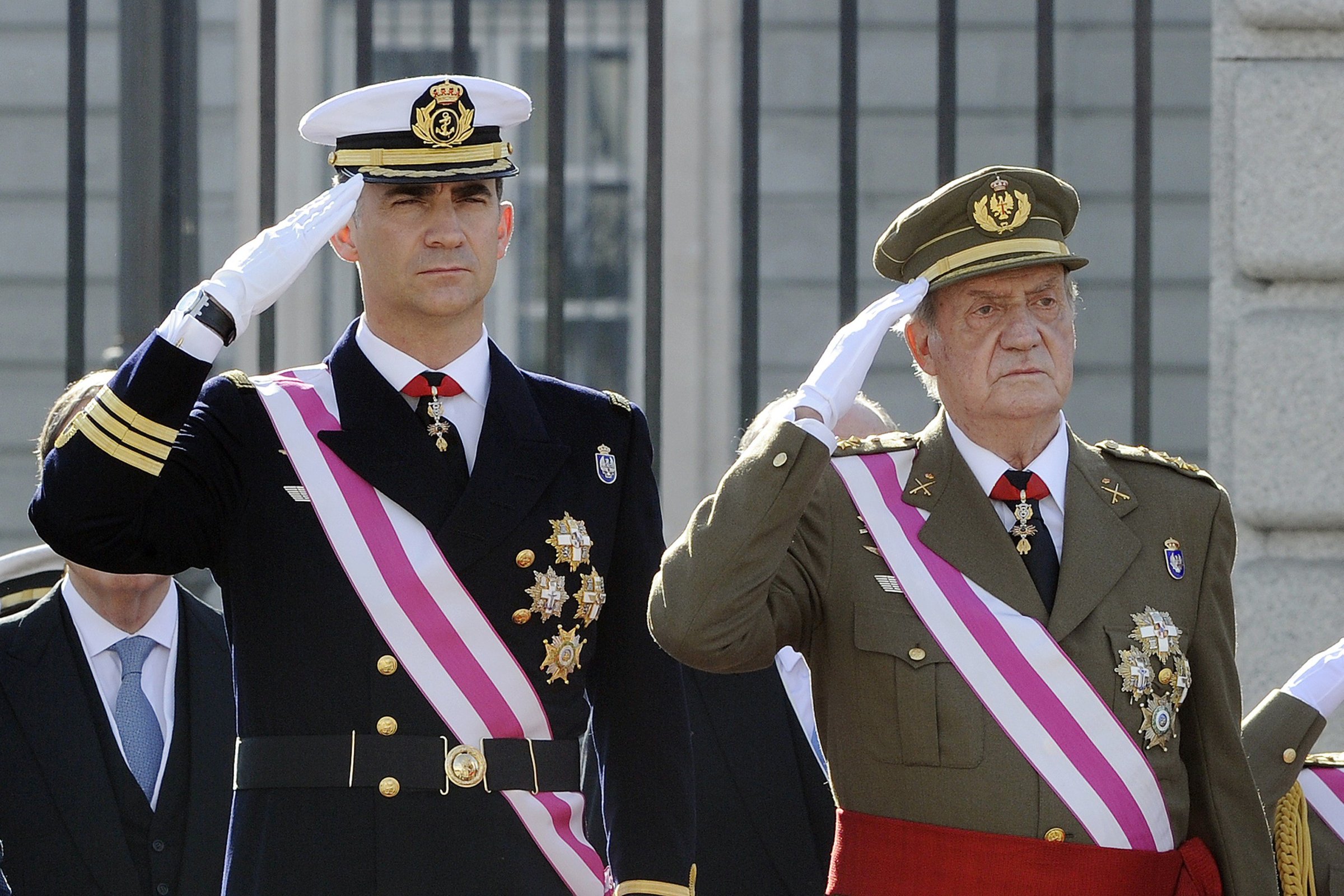
Just after one o’clock in the morning on Feb. 23, 1981, while most of the country’s legislators cowered beneath their desks, a young King Juan Carlos appeared on television screens across Spain. Dressed in his army uniform, he denounced an attempted coup then underway on the floor of Parliament by armed military officers intent on returning the country to a rightwing dictatorship. That act of political courage would not only bring the insurrection to a quick and bloodless end, but would cement the king’s reputation for decades to come. Britain might chortle at a prince given to dialing in distasteful endearments to a woman not (then) his wife, and Monaco might mock a princess given to body guards and elephant trainers. But for decades after Juan Carlos assumed the throne in 1975, Spain largely respected and admired its monarch. Yet even the memory of heroism can’t withstand expensive, indiscreet travels and a money-skimming son-in-law, at least not at a time of dire economic crisis. In recent years, the king’s reputation has been profoundly damaged, and with it, the monarchy’s. The abdication Juan Carlos announced Monday, after 39 years of rule, was quite possibly the best option left to him for preserving it.
By abdicating in favor of his son Felipe, Juan Carlos has tapped the one adult member of the royal family—apart from his wife Queen Sofia—who still ranks high in the public’s esteem. With a Master’s degree in international relations from Georgetown University, and an apparently happy marriage that has produced two adorably media-friendly young girls, Felipe seems well-prepared for the role of modern monarch. Perhaps more importantly, he has avoided the scandals that have plagued his siblings Elena (divorce) and Cristina (alleged embezzlement and influence-peddling), and his father (breaking a hip while on a secret elephant-hunting trip in Botswana with a woman who is not his wife). A January survey conducted by the Spanish polling firm Sigma Dos gave the crown prince an approval rating of 66% (versus his father’s 41%); 57% of those polled said they believed he could restore the crown’s prestige.
But Felipe has the possibility to do far more than improve the fortunes of a declining monarchy. The crisis in Spain, after all, is not just economic—it’s also political, with deep and broad corruption permeating every level of government. Witness the Gurtel case, in which dozens of leading officials in the region of Valencia have been charged with bribery and money laundering. Or the Barcenas case, in which a former treasurer for the ruling Popular Party has admitted to maintaining secret accounts through which he supplemented the salaries of the party’s upper echelons. That’s without mentioning the Infanta Cristina and her husband Iñaki Urdangarin, indicted for using their purportedly not-for-profit Noós Institute to allegedly embezzle some 8 million euros, mostly from government contracts.
Exacerbating the sense of decay in Spain is the lack of strong alternatives for political leadership. The prime minister, Mariano Rajoy, is a technocrat who own approval ratings stand at about 22%. The uncharismatic opposition leader, Alberto Rubalcaba, is an old-school Socialist who just resigned in the face of his own party’s catastrophic showing in the European Union elections on May 25. In fact, Spaniards are so desperate for change that in those elections they denied both the Socialists and the Popular Party a majority for the first time in the country’s 35 years of democracy. Instead, they gave 8% of the vote—and five seats in the European parliament—to an upstart, anti-austerity, anti-establishment party called Podemos (We Can) that was founded just three months ago.
And here’s where Felipe, with his 66% approval rating, comes in. Other monarchs have used their influence to lessen tensions or ameliorate their domestic political situation. Although Thailand’s King Bhumibol Adulyadej recently threw his support behind the leader of a military coup in the country, he had previously, and for many years, defused tensions in his country by forcing the military to talk with the protestors who opposed them. King Albert II more than once prevented the collapse of Belgium’s often fragile government by bringing opposing political leaders back to the bargaining table.
So imagine this: A newly coronated King Felipe announces that transparency will be his first order of business. To that end, he will open all of the palace’s accounts to full public scrutiny. (In an attempt to improve its image the palace recently announced it would voluntarily adhere to Spain’s new transparency law, but with many loopholes.) He will demand that his sister and brother-in-law, if found guilty, face the same punishment of any other Spaniard. And he will encourage all of Spain’s institutions to follow suit, to embrace transparency and adopt zero tolerance for corruption.
Would it work? Although he has begun assuming more responsibilities as his father’s health has declined, Felipe is largely untested. Many Spaniards greeted Monday’s news of abdication with a rally in favor of republicanism. But many of those same people, like every Spaniard over the age of 40, remember the night 33 years ago when it seemed more than likely that, after the briefest of flirtations with democracy, the country would revert back to the authoritarianism it knew best.
For the fact that it didn’t, Spain has a king to thank.
More Must-Reads From TIME
- The 100 Most Influential People of 2024
- How Far Trump Would Go
- Scenes From Pro-Palestinian Encampments Across U.S. Universities
- Saving Seconds Is Better Than Hours
- Why Your Breakfast Should Start with a Vegetable
- 6 Compliments That Land Every Time
- Welcome to the Golden Age of Ryan Gosling
- Want Weekly Recs on What to Watch, Read, and More? Sign Up for Worth Your Time
Contact us at letters@time.com